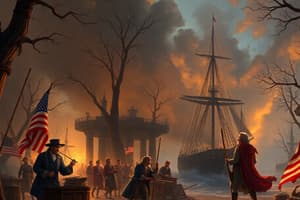Podcast
Questions and Answers
What was the primary motivation behind John Adams sending diplomats to France during the XYZ Affair?
What was the primary motivation behind John Adams sending diplomats to France during the XYZ Affair?
- To form a military alliance with France against Great Britain.
- To negotiate a peaceful resolution and maintain U.S. neutrality amidst tensions. (correct)
- To publicly denounce France's actions and provoke a war to demonstrate U.S. strength.
- To secure financial aid from France to support the Federalist Party.
How did the Federalists and Democratic-Republicans differ in their perspectives regarding the conflict with France during Adams' presidency?
How did the Federalists and Democratic-Republicans differ in their perspectives regarding the conflict with France during Adams' presidency?
- Federalists advocated for a strong stance against France, while Democratic-Republicans were more sympathetic to France. (correct)
- Both parties agreed on maintaining neutrality, but disagreed on the economic policies to implement.
- Both parties supported France but disagreed on whether to declare war on Great Britain.
- Federalists favored supporting France, while Democratic-Republicans preferred neutrality.
What was the main effect of the XYZ Affair on the relationship between the United States and France?
What was the main effect of the XYZ Affair on the relationship between the United States and France?
- It triggered the Quasi-War, an undeclared naval conflict, and increased anti-French sentiment in the U.S. (correct)
- It prompted the U.S. to pay the requested bribes to France to avoid further conflict.
- It led to a formal alliance between the U.S. and France against Great Britain.
- It resulted in a significant decrease in anti-French sentiment in the United States.
What was the primary purpose of the Alien Acts passed during John Adams' presidency?
What was the primary purpose of the Alien Acts passed during John Adams' presidency?
How did the Naturalization Act, part of the Alien Acts, impact immigrants seeking U.S. citizenship?
How did the Naturalization Act, part of the Alien Acts, impact immigrants seeking U.S. citizenship?
What was a key provision of the Sedition Act of 1798, and how did it affect political discourse in the United States?
What was a key provision of the Sedition Act of 1798, and how did it affect political discourse in the United States?
How did the Sedition Act aim to weaken the Democratic-Republican Party during Adams' presidency?
How did the Sedition Act aim to weaken the Democratic-Republican Party during Adams' presidency?
What concerns did the Alien and Sedition Acts raise among those who opposed them?
What concerns did the Alien and Sedition Acts raise among those who opposed them?
Which action taken by Thomas Jefferson demonstrated a conflict between his philosophical beliefs and his practical responsibilities as president?
Which action taken by Thomas Jefferson demonstrated a conflict between his philosophical beliefs and his practical responsibilities as president?
How did the War of 1812 contribute to the growth of the American economy?
How did the War of 1812 contribute to the growth of the American economy?
What was the primary goal of the Embargo Act of 1807, enacted during Thomas Jefferson's presidency?
What was the primary goal of the Embargo Act of 1807, enacted during Thomas Jefferson's presidency?
Which of the following describes the impact of the Marbury v. Madison Supreme Court case?
Which of the following describes the impact of the Marbury v. Madison Supreme Court case?
What was a significant consequence of the Kentucky and Virginia Resolutions, which were a response to the Alien and Sedition Acts?
What was a significant consequence of the Kentucky and Virginia Resolutions, which were a response to the Alien and Sedition Acts?
How did the War of 1812 affect the relationship between the United States government and Native American tribes?
How did the War of 1812 affect the relationship between the United States government and Native American tribes?
What factors motivated Thomas Jefferson to pursue the Louisiana Purchase in 1803?
What factors motivated Thomas Jefferson to pursue the Louisiana Purchase in 1803?
How did the Alien and Sedition Acts impact the political climate in the United States during Adam's presidency?
How did the Alien and Sedition Acts impact the political climate in the United States during Adam's presidency?
Which of the following best describes the outcome of the War of 1812?
Which of the following best describes the outcome of the War of 1812?
What was the primary cause of the War with Tripoli (1801-1805) during Jefferson's presidency?
What was the primary cause of the War with Tripoli (1801-1805) during Jefferson's presidency?
Flashcards
First Amendment Violation
First Amendment Violation
Conflicted with free speech and press, leading to political turmoil.
Kentucky and Virginia Resolutions
Kentucky and Virginia Resolutions
Documents arguing states can nullify unconstitutional federal laws.
Marbury v. Madison
Marbury v. Madison
Supreme Court case that established judicial review in 1803.
Louisiana Purchase
Louisiana Purchase
Signup and view all the flashcards
War with Tripoli
War with Tripoli
Signup and view all the flashcards
Embargo Act of 1807
Embargo Act of 1807
Signup and view all the flashcards
War of 1812 Causes
War of 1812 Causes
Signup and view all the flashcards
Battle of New Orleans
Battle of New Orleans
Signup and view all the flashcards
Treaty of Ghent
Treaty of Ghent
Signup and view all the flashcards
Increased U.S. Nationalism
Increased U.S. Nationalism
Signup and view all the flashcards
John Adams
John Adams
Signup and view all the flashcards
XYZ Affair
XYZ Affair
Signup and view all the flashcards
Quasi-War
Quasi-War
Signup and view all the flashcards
Alien Acts
Alien Acts
Signup and view all the flashcards
Naturalization Act
Naturalization Act
Signup and view all the flashcards
Sedition Act
Sedition Act
Signup and view all the flashcards
Federalists
Federalists
Signup and view all the flashcards
Democratic-Republicans
Democratic-Republicans
Signup and view all the flashcards
Study Notes
John Adams' Presidency (1797-1801)
- XYZ Affair (1797-1798): France seized American ships, leading to diplomatic negotiations. Federalists favored a strong response, while Democratic-Republicans were more lenient towards France.
- Quasi-War (1798-1800): The U.S. refused French demands, resulting in an undeclared naval war. Anti-French sentiment rose, and Federalist support for a strong navy increased.
Alien and Sedition Acts (1798)
- Historical Context: Tensions with France due to XYZ Affair fueled anxieties about immigrant influence. Federalists feared immigrants sympathizing with the Democratic-Republicans.
- Purpose: To limit the political power of immigrants and to suppress dissent during a period of possible war.
- Alien Acts: Restricted immigration and gave the president increased power over foreigners.
- Naturalization Act: Increased citizenship application time.
- Alien Friends Act: Allowed for the deportation of any non-citizen deemed dangerous.
- Alien Enemies Act: Allowed for the deportation or imprisonment of citizens of enemy nations in wartime.
- Effects: Reduced immigrant voting power, raised concerns about presidential power, and sparked opposition. The Acts were unpopular with immigrants and Democratic-Republicans.
Thomas Jefferson's Presidency (1801-1809)
Marbury v. Madison (1803)
- Historical Context: The appointment of "Midnight Judges." James Madison, Jefferson's Secretary of State, refused to deliver Marbury's commission.
- Purpose: Marbury sued to force Madison to deliver his appointment.
- Effect: Established judicial review, granting the Supreme Court the power to declare laws unconstitutional.
Louisiana Purchase (1803)
- Historical Context: Napoleon needed funds for European wars and was relinquishing control of North American territories.
- Purpose: Secure U.S. access to the Mississippi River and New Orleans for trade.
- Effect: Doubled U.S. territory, enhancing westward expansion and strengthening federal power.
War with Tripoli (1801-1805)
- Historical Context: Barbary pirates demanded tributes for protection from attacks.
- Purpose: End U.S. dependence on bribery of pirates.
- Effect: Demonstrated the U.S. would defend its trade interests, strengthening naval power.
Embargo Act (1807)
- Historical Context: Britain and France seized American ships and impressed American sailors.
- Purpose: Use economic restrictions to pressure Britain and France.
- Effect: Damaged the U.S. economy, especially New England, and led to smuggling.
James Madison's Presidency (1809-1817) and War of 1812
Four Major Causes of the War of 1812
- British Trade Restrictions: Impressment of sailors, restrictions on trade, and violation of U.S. neutrality.
- Native American Conflict: Native Americans, armed by the British, challenged expansion. This threat to borders was part of the larger cause.
- Desire for Expansion: The need for land
Four Major Impacts of the War of 1812
- Increased Nationalism: U.S. victory (or stalemate depending on perspective), and the perception of gaining independence and standing up to Britain.
- Weakened Native American Resistance: Tecumseh's death and reduced British support for Native American resistance paved the way for westward expansion.
- Boosted U.S. Manufacturing: British blockade spurred domestic industry.
- Treaty of Ghent (1814): The war ended in a stalemate with no significant territorial changes. Increased international standing.
Studying That Suits You
Use AI to generate personalized quizzes and flashcards to suit your learning preferences.




